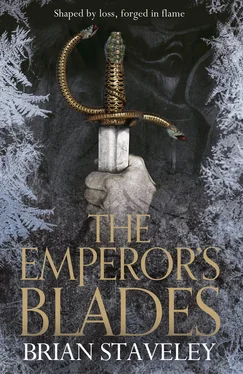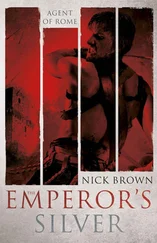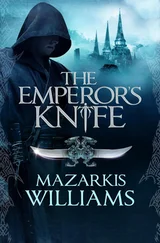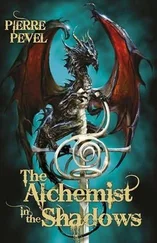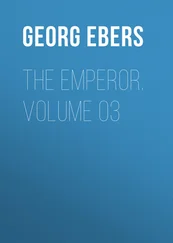Brian Staveley - The Emperor's blades
Здесь есть возможность читать онлайн «Brian Staveley - The Emperor's blades» весь текст электронной книги совершенно бесплатно (целиком полную версию без сокращений). В некоторых случаях можно слушать аудио, скачать через торрент в формате fb2 и присутствует краткое содержание. Год выпуска: 2014, ISBN: 2014, Издательство: Macmillan, Жанр: Фэнтези, на английском языке. Описание произведения, (предисловие) а так же отзывы посетителей доступны на портале библиотеки ЛибКат.
- Название:The Emperor's blades
- Автор:
- Издательство:Macmillan
- Жанр:
- Год:2014
- ISBN:9781466828438
- Рейтинг книги:4 / 5. Голосов: 1
-
Избранное:Добавить в избранное
- Отзывы:
-
Ваша оценка:
- 80
- 1
- 2
- 3
- 4
- 5
The Emperor's blades: краткое содержание, описание и аннотация
Предлагаем к чтению аннотацию, описание, краткое содержание или предисловие (зависит от того, что написал сам автор книги «The Emperor's blades»). Если вы не нашли необходимую информацию о книге — напишите в комментариях, мы постараемся отыскать её.
The Emperor's blades — читать онлайн бесплатно полную книгу (весь текст) целиком
Ниже представлен текст книги, разбитый по страницам. Система сохранения места последней прочитанной страницы, позволяет с удобством читать онлайн бесплатно книгу «The Emperor's blades», без необходимости каждый раз заново искать на чём Вы остановились. Поставьте закладку, и сможете в любой момент перейти на страницу, на которой закончили чтение.
Интервал:
Закладка:
Up close, Ashk’lan didn’t look like much, especially at night: three long, stone halls with wooden roofs-the dormitory, refectory, and meditation hall-forming three sides to a rough square, their pale granite walls washed as though with milk in the moonlight. The whole compound perched on the cliff’s edge, and the fourth side of the square opened out onto cloud, sky, and an unobstructed view of the foothills and distant steppe to the west. Already the grasslands far below were vibrant with the spring froth of flowers: swaying blue chalenders, clusters of nun’s blossom, riots of tiny white faith knots. At night, however, beneath the cold, inscrutable gaze of the stars, the steppe was invisible. Staring out past the ledges, Kaden found himself facing a vast emptiness, a great dark void. It felt as though Ashk’lan stood at the world’s end, clinging to the cliffs, holding vigil against a nothingness that threatened to engulf creation. After a second swig of water, he turned away. The night had grown cold, and now that he had stopped running, gusts of wind off the Bone Mountains sliced through his sweaty robe like shards of ice.
With a rumble in his stomach, he turned toward the yellow glow and murmur of conversation emanating from the windows of the refectory. At this hour-just after sunset but before night prayer-most of the monks would be taking a modest evening meal of salted mutton, turnips, and hard, dark bread. Heng, Kaden’s umial, would be inside with the rest, and with any luck, Kaden could report what he had seen, dash off a quick painting to show the scene, and sit down to a warm meal of his own. Shin fare was far more meager than the delicacies he remembered from his early years in the Dawn Palace, before his father sent him away, but the monks had a saying: Hunger is flavor.
They were great ones for sayings, the Shin, passing them down from one generation to the next as though trying to make up for the order’s lack of liturgy and formal ritual. The Blank God cared nothing for the pomp and pageantry of the urban temples. While the young gods glutted themselves on music, prayer, and offerings laid upon elaborate altars, the Blank God demanded of the Shin one thing only: sacrifice, not of wine or wealth, but of the self. The mind is a flame, the monks said. Blow it out.
After eight years, Kaden still wasn’t sure what that meant, and with his stomach rumbling impatiently, he couldn’t be bothered to contemplate it. He pushed open the heavy refectory door, letting the gentle hum of conversation wash over him. Monks were scattered around the hall, some at rough tables, their heads bent over their bowls, others standing in front of a fire that crackled in the hearth at the far end of the room. Several sat playing stones, their eyes blank as they studied the lines of resistance and attack unfolding across the board.
The men were as varied as the lands from which they had come-tall, pale, blocky Edishmen from the far north, where the sea spent half the year as ice; wiry Hannans, hands and forearms inked with the patterns of the jungle tribes just north of the Waist; even a few Manjari, green-eyed, their brown skin a shade darker than Kaden’s own. Despite their disparate appearances, however, the monks shared something, a hardness, a stillness born of a life lived in the hard, still mountains far from the comforts of the world where they had been raised.
The Shin were a small order, with barely two hundred monks at Ashk’lan. The young gods-Eira, Heqet, Orella, and the rest-drew adherents from three continents and enjoyed temples in almost every town and city, palatial spaces draped with silk and crusted with gold, some of which rivaled the dwellings of the richest ministers and atreps. Heqet alone must have commanded thousands of priests and ten times that number who came to worship at his altar when they felt the need of courage.
The less savory gods had their adherents as well. Stories abounded of the halls of Rassambur and the bloody servants of Ananshael, tales of chalices carved from skulls and dripping marrow, of infants strangled in their sleep, of dark orgies where sex and death were hideously mingled. Some claimed that only a tenth of those who entered the doors ever returned. Taken by the Lord of Bones, people whispered. Taken by Death himself.
The older gods, aloof from the world and indifferent to the affairs of humans, drew fewer adherents. Nonetheless, they had their names-Intarra and her consort, Hull the Bat, Pta and Astar’ren-and scattered throughout the three continents, thousands worshipped those names.
Only the Blank God remained nameless, faceless. The Shin held that he was the oldest, the most cryptic and powerful. Outside Ashk’lan, most people thought he was dead, or had never existed. Slaughtered by Ae, some said, when she made the world and the heavens and stars. That seemed perfectly plausible to Kaden. He had seen no sign of the god in his years running up and down the mountain passes.
He scanned the room for his fellow acolytes, and from a table over by the wall, Akiil caught his eye. He was seated on a long bench with Serkhan and fat Phirum Prumm-the only acolyte at Ashk’lan who maintained his girth despite the endless running, hauling, and building required by the older monks. Kaden nodded in response and was about to cross to them when he spotted Heng on the other side of the hall. He stifled a sigh-the umial would impose some sort of nasty penance if his pupil sat down to dinner without reporting back first. Hopefully it wouldn’t take long to relate the tale of the slaughtered goat; then Kaden could join the others; then he could finally have a bowl of stew.
Huy Heng was hard to miss. In many ways, he seemed like he belonged in one of the fine wine halls of Annur rather than here, cloistered in a remote monastery a hundred leagues beyond the border of the empire. While the other monks went about their duties with quiet sobriety, Heng hummed as he tended the goats, sang as he lugged great sacks of clay up from the shallows, and kept up a steady stream of jests as he chopped turnips for the refectory pots. He could even tell jokes while he beat his pupils bloody. At the moment, he was regaling the brothers at his table with a tale involving elaborate hand gestures and some sort of birdcall. When he saw Kaden approach, however, the grin slipped from his face.
“I found the goat,” Kaden began without preamble.
Heng extended both hands, as though to stop the words before they reached him.
“I’m not your umial any longer,” he said.
Kaden blinked. Scial Nin, the abbot, reassigned acolytes and umials every year or so, but not usually by surprise. Not in the middle of dinner.
“What happened?” he asked, suddenly cautious.
“It’s time for you to move on.”
“Now?”
“The present is the present. Tomorrow will still be ‘now.’”
Kaden swallowed an acerbic remark; even if Heng was no longer his umial, the monk could still whip him. “Who am I getting?” he asked instead.
“Rampuri Tan,” Heng replied, his voice flat, devoid of its usual laughter.
Kaden stared. Rampuri Tan did not take pupils. Sometimes, despite his faded brown robe and shaved head, despite the days he spent sitting cross-legged, eyes fixed in his devotion to the Blank God, Tan didn’t seem like a monk at all. There was nothing Kaden could put his finger on, but the novices felt it, too, had developed a hundred theories, attributing to the man a series of implausible pasts by turn both shadowy and glorious: he earned the scars on his face fighting wild animals in the arena at The Bend; he was a murderer and a thief, who had repented of his crimes and taken up a life of contemplation; he was the dispossessed brother of some lord or atrep, hiding at Ashk’lan only long enough to build his revenge. Kaden wasn’t much inclined to believe any of the stories, but he had noticed the common thread: violence. Violence and danger. Whoever Rampuri Tan had been before arriving at Ashk’lan, Kaden wasn’t eager to have the man for his umial.
Читать дальшеИнтервал:
Закладка:
Похожие книги на «The Emperor's blades»
Представляем Вашему вниманию похожие книги на «The Emperor's blades» списком для выбора. Мы отобрали схожую по названию и смыслу литературу в надежде предоставить читателям больше вариантов отыскать новые, интересные, ещё непрочитанные произведения.
Обсуждение, отзывы о книге «The Emperor's blades» и просто собственные мнения читателей. Оставьте ваши комментарии, напишите, что Вы думаете о произведении, его смысле или главных героях. Укажите что конкретно понравилось, а что нет, и почему Вы так считаете.
